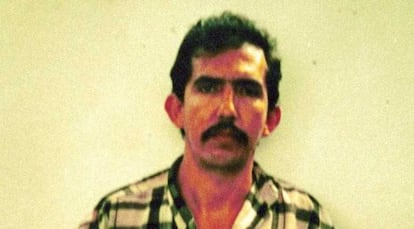Luis Alfredo Garavito, who raped and murdered 189 children, dies in Colombia
The self-confessed killer, who had been diagnosed with cancer, has died at the age of 66. He had been sentenced to 40 years in prison for his crimes, which took place in the 1990s


Luis Alfredo Garavito, who is responsible for killing and raping the highest number of children in Colombia’s history, died Thursday at the age of 66. The news was confirmed by Colombia’s National Penitentiary and Prison Institute (INPEC), which said in a statement that he had died at Santo Tomás clinic in Valledupar, where he was being treated for cancer. The Monster from Génova — as Garavito was nicknamed — was guilty of sexually abusing and murdering at least 189 minors. He confessed to the crimes, which took place in the 1990s, during a span that lasted less than a decade. A few months ago, it was revealed that Garavito had been diagnosed with cancer.
Garavito was sentenced in 2000 to more than 1,800 years in prison for killing and sexually abusing 189 children aged between eight and 16. However, he was only sentenced to 40 years in prison, which was the maximum sentence allowed by Colombian law at the time. He was still serving his sentence when he died on. Garavito — who was also known as The Beast — was captured in April 1999 and imprisoned on charges of violent sexual intercourse, violent carnal access, homicide, arson and kidnapping.
In 2021, he asked for parole on the grounds of good behavior, but was denied his request. In May of that year, the TV program Los Informantes published a letter issued by INPEC certifying the prisoner’s good behavior. However, the following November, the then director of INPEC, Mariano Botero Coy, announced that Garavito would not be released under any circumstances. The criminal — a native of the municipality of Génova (Quindío) — was serving his prison sentence in the maximum security prison of La Tramacúa, in the capital of the department of Cesar.
The self-confessed serial killer committed his crimes in at least 11 of Colombia’s 32 departments. He also committed some crimes in neighboring Ecuador. To get close to his victims, he disguised himself as a homeless person, a monk or a disabled person and approached foundations that worked with children, which were often of humble origin. Sometimes he would also lure children with sweets or promises to gain their trust and take them to less crowded areas.
Throughout his incarceration, Garavito gave several interviews to various national and international media outlets. In them, apart from confessing to the crimes and indicating where he buried his victims, he claimed to be repentant and to have embraced the Christian faith. The possibility of Garavito being released on parole has always been roundly opposed by Colombia, which lived in fear before he was arrested in the 1990s, which was already a very violent time for the country.
Sign up for our weekly newsletter to get more English-language news coverage from EL PAÍS USA Edition
Tu suscripción se está usando en otro dispositivo
¿Quieres añadir otro usuario a tu suscripción?
Si continúas leyendo en este dispositivo, no se podrá leer en el otro.
FlechaTu suscripción se está usando en otro dispositivo y solo puedes acceder a EL PAÍS desde un dispositivo a la vez.
Si quieres compartir tu cuenta, cambia tu suscripción a la modalidad Premium, así podrás añadir otro usuario. Cada uno accederá con su propia cuenta de email, lo que os permitirá personalizar vuestra experiencia en EL PAÍS.
¿Tienes una suscripción de empresa? Accede aquí para contratar más cuentas.
En el caso de no saber quién está usando tu cuenta, te recomendamos cambiar tu contraseña aquí.
Si decides continuar compartiendo tu cuenta, este mensaje se mostrará en tu dispositivo y en el de la otra persona que está usando tu cuenta de forma indefinida, afectando a tu experiencia de lectura. Puedes consultar aquí los términos y condiciones de la suscripción digital.








































